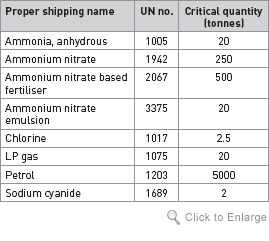Introduction
Under the Dangerous Goods Safety Act 2004, sites storing or handling dangerous goods may require licensing and compliance with the Dangerous Goods Safety (Storage and Handling of Non-explosives) Regulations 2007 and the Dangerous Goods Safety (Major Hazard Facilities) Regulations 2007, if applicable. If ammonium nitrate is being stored or handled at a site, then compliance with the Dangerous Goods Safety (Security Sensitive Ammonium Nitrate) Regulations 2007 may also apply.
Resources Safety has accredited a number of consultants who are approved to prepare and submit dangerous goods storage and handling proposals. When you have a consultant endorse your proposal as complying with the regulations, the Resources Safety checking fee does not apply. Accredited consultants are obliged to set the same standards for approvals as the Department.
Dangerous goods site licences are issued on a five yearly basis and may be renewed. Only the fees for the first year of the licence are to be lodged with the application. Fees for subsequent years will be billed annually.
[ Page Up ]
Does my site need to be licensed?
This depends on the type of product being stored and handled, the method of storage (ground level, underground, packages, manufacture or process, etc.) containment, quantity and location.
Licence applications must include locations where dangerous goods may be manufactured or processed at the site and the quantities involved.
Refer to dangerous goods safety guidance note - Licensing and exemptions for storage and handling of dangerous goods or alternatively contact an accredited dangerous goods consultant, both of which are listed in the reference material section below.
The regulations require that where licensing of dangerous goods sites is required, then storage and handling of dangerous goods is not to take place until the licence has been issued by Resources Safety. It is essential that matters relating to design, construction, location and associated items comply with the regulations and approved codes of practice e.g. relevant Australian Standards.
The flowchart will help you determine whether your site needs to be licensed.
[ Page Up ]
Major hazard facility (MHF) notification
Licensed dangerous goods sites storing specific dangerous goods above certain threshold amounts are subject to assessment to determine if they are to be managed as MHFs under the Dangerous Goods Safety (Major Hazard Facilities) Regulations 2007.
All applications for dangerous goods sites where dangerous goods may be present above a critical quantity of 10% of the major hazard facility threshold are considered by the Chief Officer to determine if the site should be declared as a MHF. Some critical quantities at which notification is required for dangerous goods sites as potential MHFs are given below.
Further information on the notification process is available on the Resources Safety website.
[ Page Up ]
Native title matters
The United Nations Declaration on the Rights of Indigenous Peoples published March 2008, and supported by the Australian Federal Government, contains the following article which is for the attention of all applicants:
Article 29(2)
'States shall take effective measures to ensure that no storage or disposal of hazardous materials shall take place in the lands or territories of indigenous peoples without their free, prior and informed consent.'
[ Page Up ]
Reference material
- Dangerous Goods Safety Act 2004
- Dangerous Goods Safety (Storage and Handling of Non-explosives) Regulations 2007
- Dangerous Goods Safety (Security Sensitive Ammonium Nitrate) Regulations 2007
- Dangerous Goods Safety (Major Hazard Facilities) Regulations 2007
(downloads of the Act and regulations are available free on the State Law Publisher’s website at www.slp.wa.gov.au)
- Dangerous Goods Safety Guidance - Licensing and exemptions for storage and handling of dangerous goods
- Dangerous Goods Safety Information sheet – Regulatory amendments to the storage and handling regulations.
- Code of practice for the design, installation and operation of underground storage systems
- Code of practice for the storage and handling of dangerous goods
- Dangerous goods sites - emergency planning code
- Operator notification form - Schedule 1 substances - MHF regulations
- List of companies and consultants approved to examine and endorse dangerous goods storage and handling proposals
- Schedule of prescribed fees and charges for dangerous goods licences
(available from www.dmp.wa.gov.au/ResourcesSafety)
[ Page Up ]



 Previous Page
Previous Page